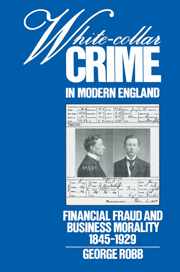Book contents
- Frontmatter
- Contents
- List of tables
- Acknowledgments
- Introduction: White-collar crime and the criminal “upperworld”
- 1 The new economy: transformation of finance and opportunities for crime
- 2 The Railway Mania
- 3 Banking and credit fraud
- 4 Stock fraud
- 5 Company fraud: promotion
- 6 Company fraud: management
- 7 Company law and the courts
- 8 Business ethics and professionalization
- Conclusion: Final considerations
- Notes
- Bibliography
- Index
1 - The new economy: transformation of finance and opportunities for crime
Published online by Cambridge University Press: 08 December 2009
- Frontmatter
- Contents
- List of tables
- Acknowledgments
- Introduction: White-collar crime and the criminal “upperworld”
- 1 The new economy: transformation of finance and opportunities for crime
- 2 The Railway Mania
- 3 Banking and credit fraud
- 4 Stock fraud
- 5 Company fraud: promotion
- 6 Company fraud: management
- 7 Company law and the courts
- 8 Business ethics and professionalization
- Conclusion: Final considerations
- Notes
- Bibliography
- Index
Summary
The extensive white-collar crimes of the nineteenth and twentieth centuries were born of the financial revolution that radically altered English finance during the early eighteenth century. The growth of a securities market and experiments in company organization fashioned a world of new possibilities for dishonest businessmen. The Industrial Revolution greatly accelerated developments in banking, credit and company formation, culminating in a second, and more profound, financial revolution in the mid-nineteenth century. The company explosion initiated by the Railway Mania of 1845, the Limited Liability Act of 1855 and the Companies Acts of 1856 and 1862 created tremendous opportunities for fraud. Big business and business crime have never been the same since.
Financial crime is as old as capitalism itself. In the fifty years following the Glorious Revolution of 1688, England experienced a profound “revolution” in public borrowing which transformed the economy and opened many doors for the resourceful swindler. The Bank of England was created in 1694 to finance the national debt, and the government securities issued by the bank, and traded on the Stock Exchange, soon became an important source of investment for the wealthier classes. These securities, or funds, were also the source of some of the earliest white-collar crime. Sir Henry Furnese, a seventeenth-century director of the Bank, participated in a number of schemes for artificially lowering the price of the funds and then purchasing as much as possible at the reduced price. Such transactions had a demoralizing effect on the entire Exchange.
- Type
- Chapter
- Information
- White-Collar Crime in Modern EnglandFinancial Fraud and Business Morality, 1845–1929, pp. 11 - 30Publisher: Cambridge University PressPrint publication year: 1992
- 1
- Cited by



